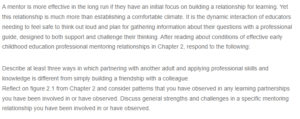Journal-Mentoring
Partnering With Other Adults and Applying Professional Skills and Knowledge
Partnering with other adults and applying professional knowledge and skill differs from simply building a friendship with a colleague because such professional partnerships are purposely for learning and pursuing a profession. In contrast, a friendship with a colleague has no proper objective. Secondly, partnering and applying professional knowledge has established expectations. The adult can be a mentor who expects positive results at the end of a partnership, while a friendship often has no such set expectations because there is no common goal or point of view. Besides, they are just friends, and that is all (Chu, 2013). Thirdly, collaborating for professional purposes has an evaluation process, while a friendship with a colleague often has no evaluation process. In the end, in a professional partnership, there is an assessment that will evaluate one’s progress, which makes this partnership different from an ordinary friendship that is never compelled to any evaluation.
General Strengths and Challenges of Specific Mentoring Relationships
I have engaged in an early childhood education mentorship. The mentor here was my aunt. The general strengths were that my mentor had the same point of view as she was an experienced early childhood tutor while I was still learning and aiming to be an early childhood tutor in the future. Therefore, she was much more knowledgeable and could guide me better. Secondly, she set clear professional boundaries regardless of being my aunt. We would review and negotiate a learning agreement, and we were often time conscious, organized, and always prepared. Finally, she maintained openness, which built trust and respect in our relationship. The only challenge was that my mentor was my aunt, and I felt uneasy sharing my troubles with her, yet I trusted her. Perhaps, this was because she was a close relative.
References
Chu, M. (2013). Developing Mentoring and Coaching Relationships in Early Care and Education: A Reflective Approach. Pearson Higher Ed.
ORDER A PLAGIARISM-FREE PAPER HERE
We’ll write everything from scratch
Question
A mentor is more effective in the long run if they have an initial focus on building a relationship for learning. Yet this relationship is much more than establishing a comfortable climate. It is the dynamic interaction of educators needing to feel safe to think out loud and plan for gathering information about their questions with a professional guide, designed to both support and challenge their thinking. After reading about conditions of effective early childhood education professional mentoring relationships in Chapter 2, respond to the following:

Journal-Mentoring
Describe at least three ways in which partnering with another adult and applying professional skills and knowledge is different from simply building a friendship with a colleague.
Reflect on figure 2.1 from Chapter 2 and consider patterns that you have observed in any learning partnerships you have been involved in or have observed. Discuss general strengths and challenges in a specific mentoring relationship you have been involved in or have observed.

